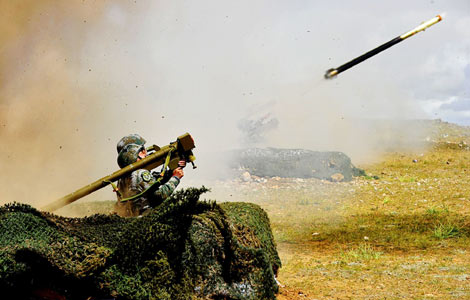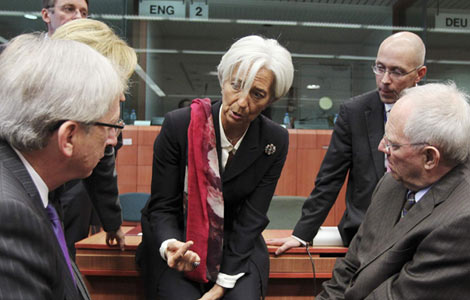|
|||||||||||
Italy
Meeting of two ancient cultures
By Xu Lin
"Western culture started to spread to China long ago. But now it's time for Chinese culture to be promoted to the western world. I'm glad that more and more foreigners are interested in China and its language," Zhang Qun says.
Zhang, 51, has just returned from Italy to Shanghai, after finishing his tenure as the head of Confucius Institute at the Oriental University of Naples, in southern Italy.
 |
|
Zhang Qun feels it is time the West learned more of Chinese culture in an exchage between civilizations. [Photo provided to China Daily] |
In 2007, SISU established the Confucius Institute together with the Oriental University of Naples, which itself had a long history of Chinese studies in Europe. This is the second Confucius Institute founded in Italy, which has 10 in total, including a Confucius Institute that offers Chinese teaching programs on air.
Zhang says SISU had offered him the director's job in 2006, but he was too busy then. In 2009, SISU asked him again and he took the offer. To prepare for the job, he underwent a two-week training before going to Italy, and then returned for another 40-day training a year later.
"The range of training is very wide, including intercultural communication, management ability, religion, diplomatic etiquette, politics, and Chinese culture," he says. He even learned tai chi, Peking Opera and paper cutting.
"Students are very interested in these typical Chinese culture. I love tai chi. When I perform tai chi for them, I can explain the Chinese culture in it, such as the concept of yin and yang," he says.
Zhang feels that Italy and China share a lot in common in terms of culture, as both are birthplaces of ancient civilizations.
"Italians are passionate and sensitive about the arts and they love Chinese arts," he says.
While the institute in Rome concentrates on Chinese teaching, the institute in Naples attaches equal importance to teaching of language and culture.
The institute offers a variety of language classes such as listening, speaking and reading, and culture courses such as tea ceremonies and calligraphy. It also organizes outings for students to watch performances by groups from China, such as kunqu, or Kun opera.
"We have a Confucius Club. When Chinese artists visit Italy, we will invite them to talk to us at our weekly gatherings. Students like to exchange views about Chinese culture," he says.
He noticed that besides university students, younger pupils and secondary school students also have an interest. For them, he established the Confucius Classrooms in five primary, secondary, and vocational schools, with 50 hours of classes a semester.
Last year was the 40th anniversary of the establishment of diplomatic relation between China and Italy, and the Year of Chinese Culture in Italy lasted from Oct 2010 to Sep 2011. To commemorate, the Chinese embassy and the local government held various activities during the Spring Festival with fireworks, dragon and lion dances, and cultural performances.
Zhang not only organized his students' participation, he also played a major part in the celebrations.
"I rented costumes of the 56 Chinese ethnic groups, complete with accessories and headgear. They were all soon distributed and those who did not get one were really sorry." The students were singing and dancing, waving flags from both countries.
"I was touched by their enthusiasm and hospitality," he says.His term was obviously one in which he truly experienced an exchange of culture between Italy and China.
You can contact the writer at xulin@chinadaily.com.cn.
Related Stories
Confucius institutes propagate China and its culture 2011-09-25 09:35
The best confucius institute in the world 2011-09-25 07:57
Confucius alive 2011-09-25 07:55
Talent holds key to Confucius Institutes' prospects 2011-09-16 10:26
Confucius Institute students visit from Pakistan 2011-07-03 08:11
Hot Topics
Libya conflict, Gaddafi, Oil spill, Palace Museum scandal, Inflation, Japan's new PM, Trapped miners, Mooncake tax, Weekly photos, Hurricane Irene
Editor's Picks

|

|

|

|

|

|







